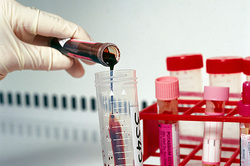 Japanese scientists have made a sensational breakthrough in the methods of diagnostics of oncological diseases. They invented a new technology that accurately detects cancer at an early stage in just 3 minutes. Japanese scientists have made a sensational breakthrough in the methods of diagnostics of oncological diseases. They invented a new technology that accurately detects cancer at an early stage in just 3 minutes.
Japanese scientists have developed a new method of diagnosing cancer that 3 minutes will designate malignant cells only one drop of blood, tells The Japan Times. This development promises to be a real breakthrough in the field of detection of oncological diseases.
On the innovation was developed by a group of experts from the clinic at the University of Sowing and company MYTECH, which is practiced in the research in the field of high-precision medical tests. The method, which was developed in 2013, is contained in that drop of blood of the patient is placed on a special plate, equipped with sensors. Then she sent the ultraviolet rays. Under the action of gauges cancer cells begin to glow, and with the cells of healthy people on the planet that doesn't happen.
This reaction is explained by the fact that cancer causes configuration in nucleosomes (the structural part of the chromosome), and installed in the plate, the chips catch these changes and cause them to glow. Besides the more biological material on the plate, the better.
The new method is not only simple but also high accuracy. The analysis demonstrated the correct result for all 20 test subjects who participated in the study. "Today, ordinary blood test detects only 10-20% of cases of cancer. In contrast, we we hope that the accuracy of our method will be the same 90%," said 1 of the chapters of the project - Dr. Yuuki Hasegawa. The scientist also stressed that the study allows to identify the disease even at a fairly early stage.
The new analysis allows to characterize most forms of cancer, even of the stomach, pancreas and intestinal tract are the most insidious in the diagnosis of disease. And yet scientists are working and working to the newest method is not so much characterized by the presence or absence of malignant cells, but also specified the type of cancer.
sections: Society, World News
|